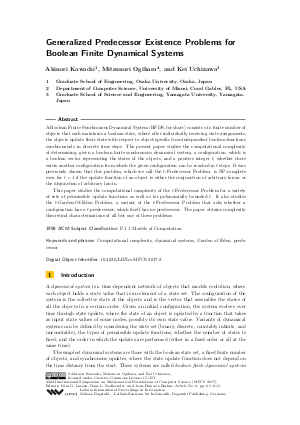Generalized Predecessor Existence Problems for Boolean Finite Dynamical Systems
Authors Akinori Kawachi, Mitsunori Ogihara, Kei Uchizawa
-
Part of:
Volume:
42nd International Symposium on Mathematical Foundations of Computer Science (MFCS 2017)
Part of: Series: Leibniz International Proceedings in Informatics (LIPIcs)
Part of: Conference: Mathematical Foundations of Computer Science (MFCS) - License:
 Creative Commons Attribution 3.0 Unported license
Creative Commons Attribution 3.0 Unported license
- Publication Date: 2017-12-01
File

PDF
LIPIcs.MFCS.2017.8.pdf
- Filesize: 461 kB
- 13 pages
Document Identifiers
Subject Classification
Keywords
- Computational complexity
- dynamical systems
- Garden of Eden
- predecessor
Metrics
- Access Statistics
-
Total Accesses (updated on a weekly basis)
0PDF Downloads0Metadata Views
Abstract
A Boolean Finite Synchronous Dynamical System (BFDS, for short) consists of a finite number of objects that each maintains a boolean state, where after individually receiving state assignments, the objects update their state with respect to object-specific time-independent boolean functions synchronously in discrete time steps. The present paper studies the computational complexity of determining, given a boolean finite synchronous dynamical system, a configuration, which is a boolean vector representing the states of the objects, and a positive integer t, whether there exists another configuration from which the given configuration can be reached in t steps. It was previously shown that this problem, which we call the t-Predecessor Problem, is NP-complete even for t = 1 if the update function of an object is either the conjunction of arbitrary fan-in or the disjunction of arbitrary fan-in. This paper studies the computational complexity of the t-Predecessor Problem for a variety of sets of permissible update functions as well as for polynomially bounded t. It also studies the t-Garden-Of-Eden Problem, a variant of the t-Predecessor Problem that asks whether a configuration has a t-predecessor, which itself has no predecessor. The paper obtains complexity theoretical characterizations of all but one of these problems.
Cite As Get BibTex
Akinori Kawachi, Mitsunori Ogihara, and Kei Uchizawa. Generalized Predecessor Existence Problems for Boolean Finite Dynamical Systems. In 42nd International Symposium on Mathematical Foundations of Computer Science (MFCS 2017). Leibniz International Proceedings in Informatics (LIPIcs), Volume 83, pp. 8:1-8:13, Schloss Dagstuhl – Leibniz-Zentrum für Informatik (2017)
https://doi.org/10.4230/LIPIcs.MFCS.2017.8
BibTex
@InProceedings{kawachi_et_al:LIPIcs.MFCS.2017.8,
author = {Kawachi, Akinori and Ogihara, Mitsunori and Uchizawa, Kei},
title = {{Generalized Predecessor Existence Problems for Boolean Finite Dynamical Systems}},
booktitle = {42nd International Symposium on Mathematical Foundations of Computer Science (MFCS 2017)},
pages = {8:1--8:13},
series = {Leibniz International Proceedings in Informatics (LIPIcs)},
ISBN = {978-3-95977-046-0},
ISSN = {1868-8969},
year = {2017},
volume = {83},
editor = {Larsen, Kim G. and Bodlaender, Hans L. and Raskin, Jean-Francois},
publisher = {Schloss Dagstuhl -- Leibniz-Zentrum f{\"u}r Informatik},
address = {Dagstuhl, Germany},
URL = {https://drops.dagstuhl.de/entities/document/10.4230/LIPIcs.MFCS.2017.8},
URN = {urn:nbn:de:0030-drops-81078},
doi = {10.4230/LIPIcs.MFCS.2017.8},
annote = {Keywords: Computational complexity, dynamical systems, Garden of Eden, predecessor}
}
